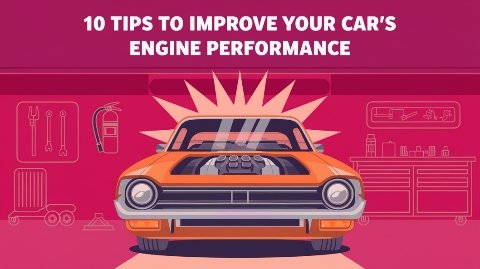10 Tips to Improve Your Car’s Engine Performance
Introduction
Your car’s engine is the heart of your vehicle, powering every drive, and its performance can directly affect fuel efficiency, power, and overall reliability. A well-maintained engine ensures not only smoother rides but also extends the vehicle’s lifespan. Whether you’re an experienced driver or just starting, these tips will help you maximize your engine’s potential and avoid costly repairs down the road.
By following these essential maintenance strategies, you can keep your engine running like new, save on fuel, and enjoy a trouble-free driving experience.

Tip 1: Regular Oil Changes
One of the simplest yet most crucial maintenance tasks is regular oil changes. Engine oil lubricates the moving parts of your engine, reducing friction, dissipating heat, and preventing damage. Over time, the oil collects dirt, debris, and contaminants, losing its ability to protect the engine effectively.
To avoid engine wear and tear, it’s recommended to change your oil every 5,000 to 7,500 miles, depending on your car’s model and the type of oil you use. If you frequently drive in extreme conditions—whether it’s very hot, cold, or dusty environments—you may need to change the oil more frequently. Always refer to your vehicle’s manual for specific recommendations.
Tip 2: Use High-Quality Fuel
Fuel quality plays a pivotal role in engine performance. While it may seem like a minor factor, using high-quality fuel can make a significant difference. Premium fuels often contain detergents and additives designed to clean your engine, reducing carbon deposits and enhancing combustion efficiency. Over time, this leads to smoother operation and better fuel economy.
Although premium fuels are more expensive than regular options, their long-term benefits far outweigh the cost. They not only improve performance but also extend the engine’s lifespan by reducing engine knocking and wear. Always use the fuel type recommended by your manufacturer to optimize your engine’s efficiency.
Tip 3: Keep the Engine Clean
A clean engine performs better and lasts longer. Dust, grime, and debris can build up over time, affecting the engine’s performance and cooling capacity. When dirt accumulates on components like the radiator or the engine block, it can lead to overheating or reduced fuel efficiency.
Regularly cleaning your engine bay ensures better airflow and allows your engine to cool more effectively. Be careful when cleaning, though—use only gentle cleaning solutions, and avoid water contact with electrical components. Keeping the engine clean also allows you to spot potential issues such as oil leaks or worn-out parts more easily.
Tip 4: Replace Air Filters Regularly
The air filter in your car ensures that clean air is delivered to the engine for combustion. Over time, it can get clogged with dirt, dust, and debris, reducing airflow and decreasing engine performance. A dirty air filter can lower fuel economy, reduce acceleration, and even cause the engine to misfire.
Replacing the air filter every 12,000 to 15,000 miles—or sooner if you drive in dusty conditions—can significantly enhance your engine’s efficiency. A fresh air filter allows for a smooth combustion process, improves fuel efficiency, and ensures that your engine receives the right mix of air and fuel.
Tip 5: Check Spark Plugs
Spark plugs ignite the air-fuel mixture in your engine’s combustion chamber. Worn or dirty spark plugs can lead to engine misfires, poor fuel economy, and sluggish acceleration. Ensuring they are in good condition is vital for maintaining engine power and efficiency.
It’s recommended to check and replace spark plugs every 30,000 miles, or as per your manufacturer’s guidelines. Doing so ensures optimal combustion, leading to better performance and lower emissions. Upgrading to high-quality spark plugs can further boost your engine’s overall performance.
Tip 6: Maintain the Cooling System
Your car’s cooling system is responsible for regulating the engine’s temperature. Without proper cooling, the engine can overheat, leading to severe damage. Regularly check the coolant level and ensure that there are no leaks in the hoses or the radiator.
Flushing the coolant system every 30,000 miles helps remove rust, scale, and debris that can accumulate over time. By maintaining the cooling system, you can prevent overheating and ensure that your engine remains at optimal operating temperature.
Tip 7: Use Fuel Additives
Fuel additives are specially formulated chemicals added to fuel to clean the engine’s internal components. They can improve fuel efficiency, reduce engine knocking, and enhance the overall performance of your engine. Additives help break down carbon deposits that accumulate in the fuel injectors, intake valves, and combustion chambers.
However, fuel additives should be used sparingly and only when recommended by your vehicle’s manufacturer. Overusing additives can lead to build-up or damage to other parts of the engine. Choose products that are approved for your car type and see an improvement in your vehicle’s fuel economy and smoothness.
Tip 8: Regularly Inspect Belts and Hoses
Belts and hoses are critical components in your engine’s system, driving key elements like the alternator, water pump, and air conditioning compressor. Over time, they can wear down, crack, or even snap, leading to breakdowns or engine failure.
Regularly inspecting your belts and hoses for wear and tear can save you from unexpected issues. If you notice cracks, fraying, or any signs of damage, replace them immediately. A broken belt or leaky hose can lead to overheating or prevent the engine from running altogether.
Tip 9: Keep the Exhaust System in Good Condition
The exhaust system plays a key role in removing harmful gases from the engine and improving overall efficiency. A well-maintained exhaust system allows your engine to breathe better, improving performance and fuel economy.
Regularly checking for leaks, ensuring the catalytic converter is functioning properly, and replacing rusted or worn parts can keep your exhaust system in top shape. A malfunctioning exhaust not only impacts performance but can also lead to increased emissions and failed inspections.
Tip 10: Drive Smoothly
Your driving habits can significantly influence your engine’s performance and longevity. Sudden acceleration, hard braking, and aggressive driving put extra strain on the engine, leading to wear and tear.
Driving smoothly, maintaining steady speeds, and avoiding sudden stops helps reduce engine stress. By doing this, you can improve fuel economy, prolong the life of engine components, and enjoy a smoother ride.
Conclusion
By following these ten tips, you can greatly improve your car’s engine performance and extend its lifespan. Regular maintenance and mindful driving not only enhance engine efficiency but also save you from costly repairs. Implement these practices today, and enjoy a more reliable, powerful driving experience.







3 comments